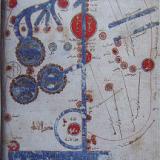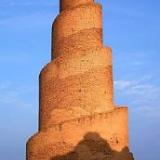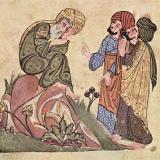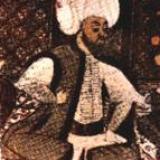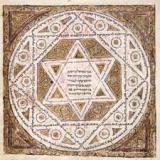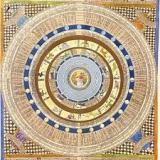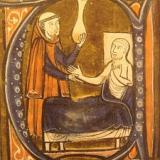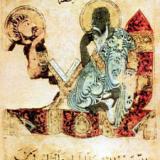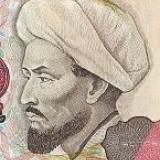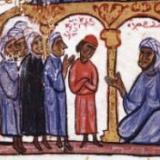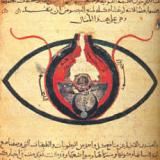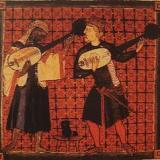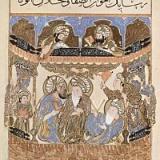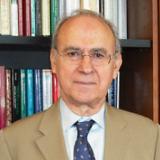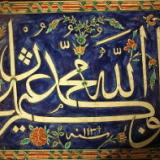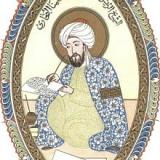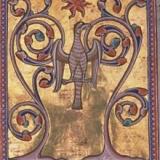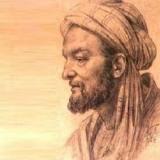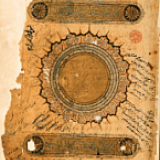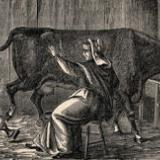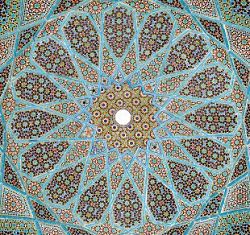Formative Period
Philosophy in the Islamic world begins in the 9th century, as thinkers respond to the impact of Greek works translated into Arabic, and come to grips with the subtle inquiries of Muslim theology (kalām). Beginning with the early theologians known as the Mu'tazilites and the work of al-Kindi, Peter traces the story up to the time of Avicenna (11th century), who was the pivotal figure for philosophy in Islam. Also considered are the contributions of Jewish thinkers like Saadia Gaon and Christians who wrote in Arabic, such as Yahya ibn 'Adi and other members of the Baghdad school. This series of episodes includes interviews with Deborah Black, Farhad Daftary, Frank Griffel, Dimitri Gutas, and Peter E. Pormann.
A book version of these podcasts is available from Oxford University Press.
For selections of primary texts in translation:
M.A. Khalidi, Medieval Islamic Philosophical Writings (Cambridge: 2005).
J. McGinnis and D.C. Reisman (ed. and trans.), Classical Arabic Philosophy: an Anthology of Sources (Indianapolis: 2007).
And see also:
P. Adamson, Philosophy in the Islamic World: A Very Short Introduction (Oxford: 2015).
P. Adamson and R.C. Taylor (eds), The Cambridge Companion to Arabic Philosophy (Cambridge: 2005).
P. Adamson (ed.), Classical Arabic Philosophy: Sources and Reception (London: 2007).
P. Adamson, Studies on Early Arabic Philosophy (Aldershot: 2015).
M. Campanini, An Introduction to Islamic Philosophy (Edinburgh: 2008).
T.-A. Druart, “Philosophy in Islam,” in The Cambridge Companion to Medieval Philosophy, ed. A.S. McGrade (Cambridge: 2003), 97-120.
K. El-Rouayheb and S. Schmitdke (eds), The Oxford Handbook to Islamic Philosophy (Oxford: 2016).
G. Endress, “The Defense of Reason: the Plea for Philosophy in the Religious Community,” Zeitschrift für Geschichte der arabisch-islamische Wissenschaften 6 (1990), 1-49.
M. Fakhry, A History of Islamic Philosophy (New York: 1983).
G. Hourani (ed.), Essays on Islamic Philosophy and Science (Albany: 1978).
M.E. Marmura (ed.), Islamic Theology and Philosophy (Albany: 1984).
S.H. Nasr and O. Leaman (eds), History of Islamic Philosophy, 2 vols. (London: 1996).
U. Rudolph (ed.) Grundriss der Geschichte der Philosophie. Philosophie in der islamischen Welt, Bd.1: 8.-10. Jahrhundert(Basel: 2012). Translated into English as U. Rudolph, R. Hansberger and P. Adamson (eds), Philosophy in the Islamic World, Vol.1: 8-10th Century (Leiden: 2016).
S. Schmidtke (ed.), The Oxford Handbook of Islamic Theology (Oxford: 2016).
W.M. Watt, The Formative Period of Islamic Thought (Oxford: 1973).
Bibliography on individual thinkers and movements can be found on the pages of the relevant podcasts.
Posted on
The rise of Islam creates a new context for philosophy not only among Muslims, but also Jews and Christians.
Posted on
A first look at the philosophical contributions of Islamic theology (kalām) and its political context, focusing on the Mu'tazilites Abū l-Hudhayl and al-Naẓẓām.
Posted on
Greek philosophy and science make their way into the Islamic world via Syriac and Arabic translations and interpretations.
Posted on
Al-Kindī uses Hellenic materials to discuss the eternity of the world, divine attributes, and the nature of the soul.
Posted on
The roots of Jewish philosophy in the Islamic world, focusing on the Rabbinic background in the Mishnah and Talmud, and the thought of early figures like Isaac Israeli.
Posted on
Saadia Gaon draws on philosophy and Islamic theology to provide a rational account of Jewish belief.
Posted on
The doctor and philosopher Abū Bakr al-Rāzī sets out a daring philosophical theory involving five eternal principles: God, soul, matter, time and place.
Posted on
A double dose of Peters, as Pormann joins Adamson to discuss medicine and philosophy in the Islamic world.
Posted on
A group of mostly Christian philosophers transpose the practices of antique Aristotelian philosophy to 10th century Baghdad.
Posted on
Peter begins to look at the systematic rethinking of Hellenic philosophy offered by al-Fārābī, focusing on his logic and metaphysics.
Posted on
Al-Fārābī combines Islam and Greek sources to present the ideal ruler as a philosopher who is also a prophet.
Posted on
Deborah Black joins Peter to talk about al-Farabi's innovations concerning knowledge and certainty.
Posted on
Ibn al-Haytham draws on the tradition of geometrical optics to explain the mystery of human eyesight.
Posted on
Peter turns DJ, with some actual music interspersed with discussion about theories of music in works by al-Kindī, the Brethren of Purity, and al-Fārābī.
Posted on
Drawing on Galen and Aristotle, philosophers from al-Kindi to Miskawayh compose ethical works designed us to achieve health in soul, as well as body.
Posted on
Miskawayh, al-‘Āmirī, al-Tawḥīdī, the Brethren of Purity and Ismā'īlī missionaries bring together philosophy with Persian culture, literature and Islam.
Posted on
Peter is joined by Farhad Daftary, a leading expert on the Shiite group known as the Ismā'īlīs.
Posted on
Al-Ash'arī puts his stamp on the future of Islamic theology by emphasizing God’s untrammeled power and freedom.
Posted on
Despite war, the demands of patronage, and intellectual rivalry, Avicenna (Ibn Sīnā) manages to become the most influential of all medieval philosophers.
Posted on
Avicenna revolutionizes metaphysics with groundbreaking ideas about necessity and contingency, and his new distinction between essence and existence.
Posted on
Avicenna’s proof of the Necessary Existent is ingenious and influential; but does it amount to a proof of God’s existence?
Posted on
With his Flying Man argument, Avicenna explores self-awareness and the relation between soul and body.
Posted on
Peter talks to leading Avicenna scholar Dimitri Gutas about Avicenna's sources, philosophical methods, and influence.
Posted on
Al-Ghazālī’s search for truth leads him to philosophy, Ash'arite theology, and ultimately the mystical tradition of Ṣūfism.
Posted on
In his Incoherence of the Philosophers, al-Ghazālī attacks Avicenna’s theories about the eternity of the universe and insists on the possibility of miracles.
Posted on
Why did al-Ghazālī judge "the philosophers" to be apostates? Peter finds out from Frank Griffel.




